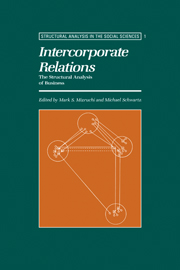Book contents
- Frontmatter
- Contents
- List of figures
- List of tables
- Introduction
- I Theoretical perspectives
- 1 A resource dependence perspective on intercorporate relations
- 2 Finance capital and the internal structure of the capitalist class in the United States
- 3 A structural approach to markets
- 4 What is money? A social structural interpretation
- 5 Corporation, class, and city system
- II National and international business structures: a comparative perspective
- Index of authors
- Subject index
1 - A resource dependence perspective on intercorporate relations
Published online by Cambridge University Press: 04 February 2010
- Frontmatter
- Contents
- List of figures
- List of tables
- Introduction
- I Theoretical perspectives
- 1 A resource dependence perspective on intercorporate relations
- 2 Finance capital and the internal structure of the capitalist class in the United States
- 3 A structural approach to markets
- 4 What is money? A social structural interpretation
- 5 Corporation, class, and city system
- II National and international business structures: a comparative perspective
- Index of authors
- Subject index
Summary
The literature on organizations has been dominated by a rationalistic, individualistic perspective and, for the most part, has denied both the reality of organizations as institutions (Zucker, 1983) as well as the embedded and at times quasi-political character of organizational action and choice (Granovetter, 1985). Thus, for instance, much of the writing in the 1950s and 1960s, particularly that emanating from schools of administration, emphasized the primacy and efficacy of managerial action. The behavior of organizations was to be understood in terms of concepts such as leadership, managerial values, style, culture, and strategy (Miles and Snow, 1978). The emphasis on proactive, intentional managerial action remains a prominent, if not dominant, theme in contemporary writing as well (Bourgeois, 1984; Peters and Waterman, 1982).
Such a focus has two consequences. First, attention is directed inside the organization in seeking explanations of organizational practices and decisions. If managerial intention and choice are prepotent, it is inevitably to managerial decision-making that one must look to understand organizations. Such a focus continues to dominate the managerial literature on organizations as well as much of the social science literature more generally. It fits prevailing social ideologies emphasizing the individual, rational choice and decisionmaking, and managerial accountability as well as being consistent with cognitive biases that tend to lodge causation in individuals rather than in their environments (Nisbett and Ross, 1980).
Second, this focus tends to deny the institutional reality of organizations.
- Type
- Chapter
- Information
- Intercorporate RelationsThe Structural Analysis of Business, pp. 25 - 55Publisher: Cambridge University PressPrint publication year: 1988
- 65
- Cited by



